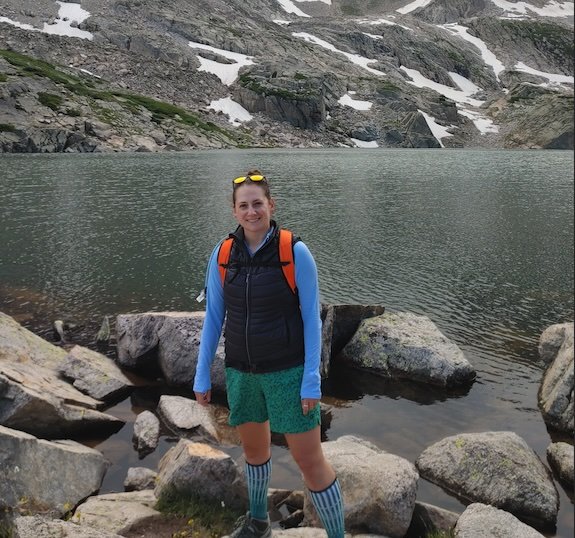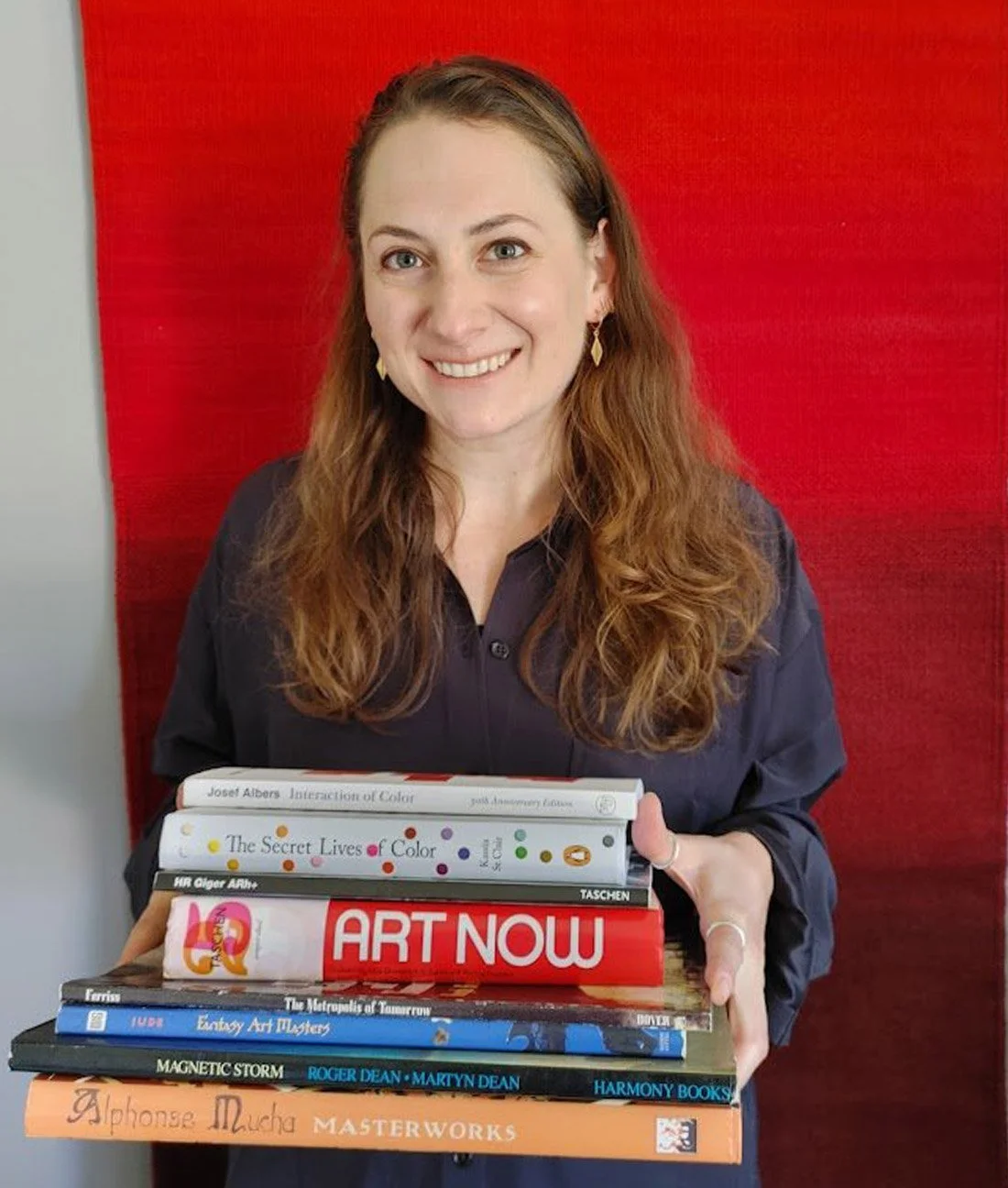Self-Advocacy Q&A with Alicia Disantis: Generalized Anxiety Disorder and Obsessive-Compulsive Disorder
Alicia Disantis
Owner, 38th & Kip Studio
Living with Generalized Anxiety Disorder (GAD) and Obsessive-Compulsive Disorder (OCD). Emphasizing the importance of self-advocacy and the need to break the stigma around mental illness and creativity.
“ I want folks to know that someone can seem just fine on the outside but is holding it together by a mere thread, getting by second by second. I want people to know there is no shame in taking a pill because your brain doesn’t produce the right chemicals. ”
Tell us a bit about yourself, your diagnosis journey and the invisible condition(s) you are living with.
My name is Alicia and I am the owner of a marketing and design studio called 38th & Kip, based in Roanoke, VA and Denver, CO. I am an art kid at heart, but over the years developed a fascination with marketing psychology, like how people respond to colours, words, and images. I am so humbled to be able to do what I wanted to do since I was little - draw and write for a living.
Speaking of being little, I’ve had GAD (generalized anxiety disorder) and OCD (Obsessive Compulsive Disorder) from my earliest memories. I was only formally diagnosed about a decade ago and spent 25 years coping with this illness as best I could on my own. In my mid to late twenties, my mental health deteriorated, culminating in panic attacks, agoraphobia, and outrageous fears of being a menace to society. All through it, I hung on by a thread, keeping a steady job, growing my business, training for 5Ks, and maintaining steady relationships. But my life was a walking nightmare I couldn’t wake from.
After months of behavioural therapy (and one very bad episode where I convinced myself I had gone insane), my psychologist gently, but firmly, suggested I start taking medication. I resisted at first, but 10 years later I thank the heavens above for Zoloft. My anxiety and OCD will never fully disappear, but it’s something I’ve learned to manage and lead a life free of irrational fear.
How would your friends describe you and your personality?
I am outgoing and love people, which is why my fears of hurting others were so terrifying.
I am extremely sensitive to violence and suffering. I love to experience new things, meet new people, and explore new places.
I consider myself to be endlessly curious, always researching and learning about new topics, like history, architecture, culture, and art. I also have quite a bit of energy and enjoy working myself hard for a good-night’s sleep at the end of the day.
How has the invisible condition impacted your life?
When I was a child in the 90s, GAD and OCD were not discussed. Children like me were labelled as “sensitive.” I would have periods in my childhood that came close to paralyzing me with fear. A photograph I saw, a commercial, or a music video would trigger me and create a cycle of intrusive thoughts that could take months to recover from.
Even after I started taking medication, it took years to fully recover from my condition and regain trust in my thoughts. The most powerful phrase I encountered on my journey was, “Just because you have a thought, doesn’t mean it is true.”
Please share any experiences of stigma or discrimination that you have experienced due to your condition.
When I was growing up, no one talked about GAD or OCD. I would never talk about my intrusive thoughts because, firstly, I felt like people would think I was “being a baby,” and secondly, I just didn’t know how. How do I explain to someone, “I saw a photo in a book and I can’t stop thinking about it. It is haunting me.”
As I navigated into adulthood,I never wanted to be the person who was medicated. That meant I was abnormal, unworthy of healthy friendships or a relationship, right? And once I started a career, the same feelings stubbornly held on. I wouldn’t dare tell a coworker or boss that I was having these obsessive, terrifying thoughts for months on end.
What does self-advocacy mean and how have you managed to advocate for yourself? Any advice to share?
I define self-advocacy in two different ways, based on the situation. In certain scenarios, it is outward: being your own champion, speaking up for yourself and your unique needs when no one else is. In other scenarios, it is inward: the recognition that you need something - support, rest, workplace accommodations, medication – you name it.
I work to constantly remind myself that ignorance doesn’t equal maliciousness. Failure to recognize disabilities creates opportunities for education and empathy. It’s important to lead with education when self-advocating outwardly. Helping your audience understand your unique needs through examples and statistics aids in conceptualizing – and empathizing – with your situation. If folks are curious, and you are willing to share, then have a conversation.
For those who are looking to be better at inward self-advocacy, I recommend connecting with people online to learn how they embraced self-advocacy. There are so many Reddit groups and podcast communities available to help folks break down the stigma of asking for help.
What motivates you to disclose your disability despite the courage it requires?
Above all, I want to break the stigma that artists must have some kind of mental illness to create powerful work. This is absolutely untrue. We create far better work when we are healthy, rational, and able to focus.
I also want folks to know that someone can be successful and still struggle with deep mental illness. I want folks to know that someone can seem just fine on the outside but is holding it together by a mere thread, getting by second by second. I want people to know there is no shame in taking a pill because your brain doesn’t produce the right chemicals.
What encouragement would you offer to someone living with an invisible condition who is considering whether to openly share their journey and experiences?
Lead with an open mind and don’t cast judgment on folks who genuinely want to know more about your experiences. Fight the urge to feel that people have malicious intent or will use your experiences against you in some way. The reward greatly outweighs the risk.
Bio: Alicia Disantis is a traditional fine artist turned brand strategist, graphic designer, and writer. Her studio, 38th & Kip, helps companies who are doing good in the world connect with their customers through powerful words and memorable images.
Alicia is inspired by retro design, Scandinavian minimalism, and bold colors. She is an active participant in the fine arts and exhibits her photos and illustrations in galleries across the United States.
In addition, Alicia sits on the Board of Directors for Red Rocks Community College and volunteers for a variety of arts programming in public schools. Alicia received her BA in Design from The University of Toledo and her MA in Arts Management from Columbia College Chicago.
Website - 38andkip.com
LinkedIn - Alicia Disantis
Instagram - @38andkip
Youtube - 38 & Kip



